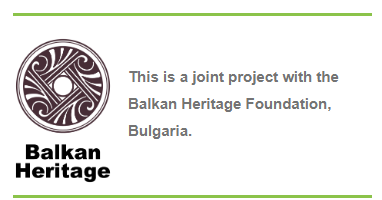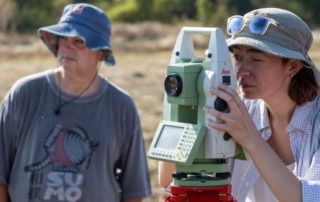
Overview
Gain essential transferable skills in photogrammetry in the heart of one of the Balkan region’s most fascinating ancient Roman sites. Your home base during this immersive, skill-based workshop will be the archaeological site of Stobi in captivating North Macedonia. Once a bustling center for salt trading and a prosperous urban hub during the Pax Romana, Stobi later became the capital of the Roman province Macedonia Secunda before suffering successive barbarian raids.
This field school is an exciting blend of seminars, field training, and lab work where you will document newly excavated areas and structures at an active archaeological dig. Over the course of 10 engaging days of fieldwork, you will learn the art and science of taking measurements from aerial and terrestrial photographs, learning to plan projects, collect data, and process results into detailed 3D models. As you work with real excavation data from Stobi, you’ll develop technical photogrammetry skills that are fully transferable to any cultural heritage project—while also exploring North Macedonia’s cultural gems on program excursions.
Field school highlights:
- Develop hands-on experience in the complete professional workflow—from project planning and archaeological drawing to technical photography, total station surveying, data collection, and photogrammetric data analysis.
- Contribute to ongoing research at an important Roman archaeological site alongside a dynamic international team of experts
- Venture beyond the dig site with guided tours to iconic heritage spots, including Bitola’s Old Town, the archaeological site of Heraclea Lyncestis, and UNESCO-listed Ohrid Lake.
| Course Details | |
|---|---|
| Course Dates | July 12 – 26, 2025 |
| Course Type | Photogrammetry |
| Instructors | Kristen Jones & Dr. George A. Bevan |
| Credits* | TBA semester (TBA quarter) |
| Apply By | April 1 |
| Fees Due By | April 15 |
| Program Fees | (2025) |
|---|---|
| Tuition | $2,990 |
| Transcript Fee* | $300 |
| Health & Evacuation Insurance | $90 |
| Room & Board | $1,270 |
| TOTAL: | $4,650 |
*This program may accept students past the deadline. Email admissions@ifrglobal.org for more information.
Instructors
The directors welcome emails and inquiries about the research elements of this project. More general information (tuition, health insurance, and payment schedule) can be found under the ‘Students’ tab above. Any further questions may be addressed to IFR staff. Additional details about research, course schedule, travel, accommodation, and safety can be found on the syllabus. Contacting the directors or the IFR office is encouraged and appreciated. It may help you determine if this field school is a good fit for you.
Testimonials
This is a new IFR field school. No student testimonials are available at this time.
Payment & Student Fees
Application Fee: There is a $45 fee to submit an online application.
Deposit Payment: A nonrefundable $500 deposit is due within 3 weeks of program acceptance in order to secure your place. The remainder of your program fees are due by the deadline indicated under “Course Details”.
*Transcript Fee & Academic Credit Opt Out: If you wish to participate in an IFR field school without earning academic credits, you will not be charged a transcript fee.
For more information about payment, fees, and policies, please see details under our Payment & Finances and Withdrawal and Cancellation Policy pages.
Accommodations
Participants stay at the recently renovated, air-conditioned cabins at the archaeological base camp next to the ancient site of Stobi. Students will be housed in rooms with 2–3 beds each. Each cabin has 4 bedrooms, a living room, and 2 bathrooms with showers. A washing machine and Wi-Fi are available for free. The Stobi cleaning staff will clean and disinfect the rooms & bathrooms and common spaces every day. In the beginning of the field school students will be introduced to the safety protocol for the hotel, the shuttle and the site upon arrival.
The closest village to Stobi is Gradsko (5 km), where there are grocery stores, a pharmacy, an ATM, and medical facilities. The closest big supermarket, drug-stores, pharmacies, banks with ATMs and hospitals are in the city of Negotino (13 km from Stobi).
Meals: Three meals (fresh, homemade food) per day are covered by the reimbursement fee. Meals usually take place at the field house premises, except for lunch packages during excursions. This field school can accommodate vegetarians, vegans and individuals with lactose-intolerance diets. Kosher and gluten-free diets are impossible to accommodate at this location.


Travel Info
Natural disasters, political changes, weather conditions and various other factors may force the cancellation or alteration of a field school. IFR recommends students only purchase airline tickets that are fully refundable and consider travel insurance in case a program or travel plans must change for any reason.
General information for this program is below, but keep in mind we will discuss any updated travel information and regulations during the required program orientation, which could affect travel plans.
Students may flay into either Skopje airport (N. Macedonia) or Thessaloniki airport (Greece). The program will arrange group shuttle service from each on arrival day.
VISA REQUIREMENTS
Citizens of EU, EEA, USA, Canada, Japan, Republic of Korea, Australia and New Zealand do not need a visa to visit N. Macedonia for up to 90 days. Citizens of all other countries may need a visa. The Balkan Heritage Foundation can send an official invitation letter that should be used at the relevant embassy to secure a visa to the program.
Citizens of all other countries may need a visa. The Balkan Heritage Foundation can send an official invitation letter that should be used at the relevant embassy to secure a visa to the program.
For more information about border crossing visit the Balkan Heritage Field School web site at http://www.bhfieldschool.org/countries/macedonia and
http://www.bhfieldschool.org/countries/bulgaria and
http://www.bhfieldschool.org/information/visa-help and the links provided there.









